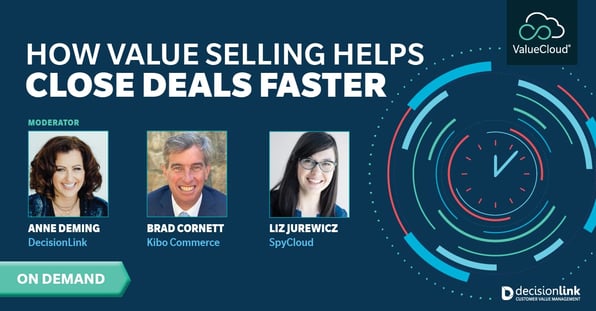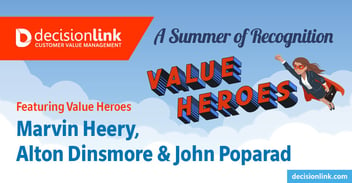Voices from the Field: How to Close Deals Faster

Accelerate your sales cycle at every stage with these key insights
Whether you’re a customer or a seller, no one wants to spend more time than necessary negotiating a sale. The good news is if you understand how to frame the benefits to the customer, selling doesn’t need to be a lengthy process.
To learn more about how a value-centric approach can save time and resources on both sides of the deal, we talked to Liz Jurewicz, Revenue Enablement Manager at SpyCloud, and Brad Cornett, Vice President of Sales at Kibo Commerce. Here are some of the insights they shared with us on the key role of value selling in accelerating deals.
Value selling gets attention in a crowded market
Gone are the days when a one-size-fits-all approach worked on any potential buyer; sending mass messages through LinkedIn isn’t going to cut it anymore. In a crowded market with new competitors every day, differentiation is key. Value selling helps you break through the noise and get clients’ attention.
By aligning your solutions’ unique benefits with your buyer’s strategic goals, your message stands out from the rest.
“Customers are generally overwhelmed with sales requests, prospecting, outreach, and communication these days,” Liz explains. “Getting their attention is harder and harder. Value-based selling is a great way to break through the noise.”
Value selling aligns all teams around a common goal
Once you’ve got a customer’s attention, value enablement across the entire customer journey helps bring everyone up to speed. Aligning your marketing, sales, and customer success teams around the specific business outcomes for each customer streamlines the hand-off process and ensures that the client gets what they were promised.
With everyone on the same page, it’s easy to create allies within the buyer organization who can advocate for your product. Brad says, “You’re just arming your champion. To sell on their behalf, make the case theirs instead of yours.”
We’ve all felt the pain when a champion in a customer account leaves. It is a tricky spot to be in to rebuild relationships and get new leaders up to speed on the great work your teams have done together. An added benefit of scaling value enablement across your company is that it gives new points of contact something tangible to grasp onto when these transitions happen.
Even though a primary relationship may be gone, the business case is still rock solid - and no one can argue with the data. “Losing a primary contact or an internal champion can be really tough. You might have somebody coming in that’s now inheriting this project who had no previous experience with it,” Liz says. “We’ve been engaging ValueCloud as a specific play to get new contacts up to speed very quickly.”
A culture of value keeps the message on point
Consistent messaging is key to establishing solid customer relationships. Centering each conversation around your customer value ensures that all sales reps build their cases on the same footing. Once her team started using ValueCloud, Liz noticed an immediate change: “They were organically telling more of a similar story and approaching our products in a more similar way that didn't feel forced.”
Beyond enabling a united outer front, value selling also aligns teams internally. As Brad points out, “Value selling isn’t a tool, it’s a culture.” At Kibo Commerce, Brad has implemented group training sessions and one-on-ones to foster this culture, even making value selling a part of the sales onboarding process. One key benefit of this structure is that it allows startups and small businesses to scale sustainably, bringing long-lasting results.
“Value selling isn’t a tool, it’s a culture.”
—Brad Cornett, VP of Sales, Kibo Commerce
Value selling helps create an ongoing conversation
Value propositions offer an entry point into an ongoing conversation about your product and what it can do for the customer. They show that you’re knowledgeable about the client’s situation and can back up your promises with results. The process of adapting and revising the initial value prop with the client further builds trust in your relationship.
“You must turn your pitch into a conversation—what you need is a meaningful dialogue.”
—Liz Jurewicz, Revenue Enablement Manager, SpyCloud
Value props don’t have to be perfect; it’s more about presenting a plausible business case than delivering a one-and-done pitch. According to Liz, “The sooner you communicate value, the faster you have a relationship that’s going to carry you through that entire sales cycle. You must turn your pitch into a conversation—what you need is a meaningful dialogue.”
Value selling helps you upsell
Value selling also makes it easier to win renewals and upsells. When you’ve delivered on value, it’s a much simpler pitch to convince the customer to upgrade their service. And in an industry where the bulk of profits come from upgrades, capturing this potential is key. “Our challenge in the market is to turn something that’s a nice-to-have into a must-have,” Brad says. With ValueCloud, his team has been able to frame their product as indispensable.
From piquing interest to building strong internal champions, and driving renewals, value selling helps accelerate deals at each stage of the customer journey. To learn more about how you can empower your team to close deals faster, check out the full webinar here.
Get to know our panelists:

Liz Jurewicz is Revenue Enablement Manager at SpyCloud

Brad Cornett is Vice President of Sales at Kibo Commerce.

 ValueCloud
ValueCloud
.png?width=118&height=76&name=Rectangle%20(3).png) ValueCloud Ignite
ValueCloud Ignite
.png?width=92&height=92&name=Rectangle%20(4).png) Free Assessment
Free Assessment
.png?width=100&height=100&name=Rectangle%20(5).png) Watch a Demo
Watch a Demo
.png?width=82&height=96&name=Rectangle%20(6).png) Value Calculator
Value Calculator

.png?width=62&height=51&name=Group%2010%20(1).png) Marketing
Marketing
 Sales
Sales
 Customer Success
Customer Success
 Engage Prospects
Engage Prospects
 Win Deals Faster
Win Deals Faster
 Retain Customers
Retain Customers
.png?width=62&height=62&name=Rectangle%20(8).png) Adopt and Scale
Adopt and Scale
.png?width=54&height=54&name=Rectangle%20(9).png) Cybersecurity
Cybersecurity
 Healthcare
Healthcare
.png?width=54&height=54&name=Rectangle%20(10).png) IT & Software
IT & Software




